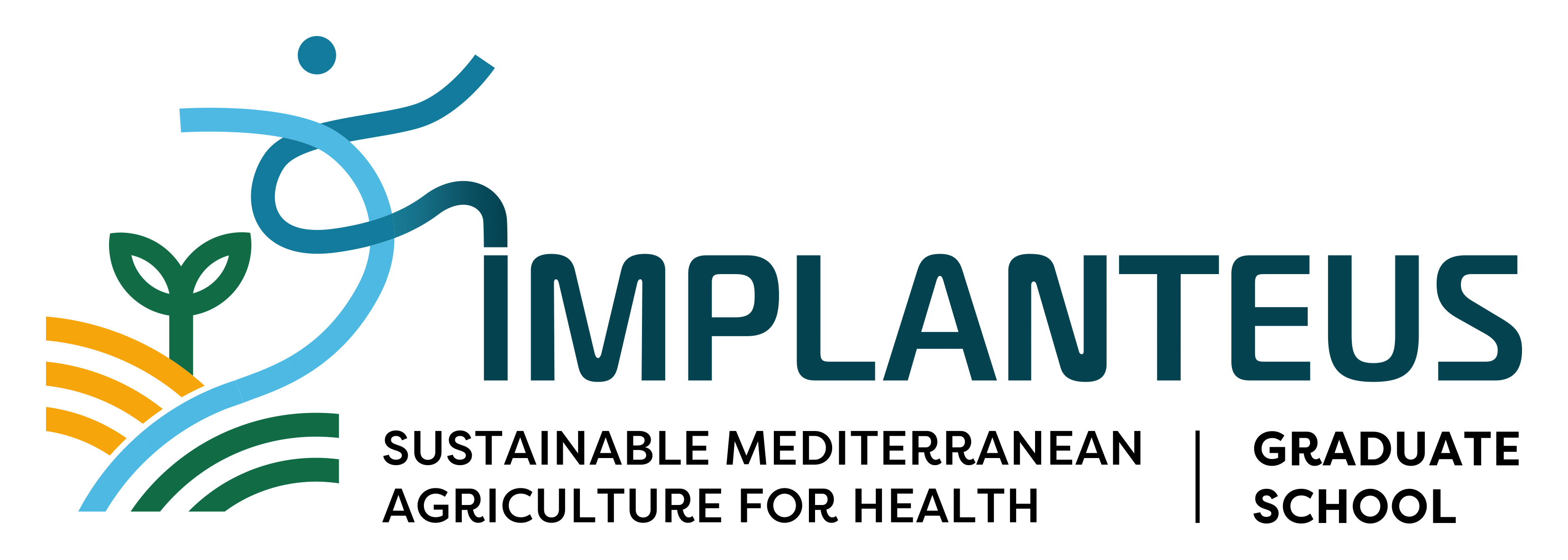Avignon University (2020-2030)
Project title : Interdisciplinary program on Mediterranean Plant Production and Processing, Environment, Human Health and Sustainability
Graduate schools are associations of Master’s and Doctoral training programs with high-level research labs of universities and partner institutes. Their goal is to strengthen the impact and international attractiveness of training programs and research carried out in specific / high-priority scientific domains.
The IMPLANTEUS graduate school, a proposal coordinated by Avignon University and the regional INRAE research center, was selected for funding by the French Government at the end of August 2019.
Its activities started at the beginning of the 2020 academic year.
Context & Scope
Mediterranean climatic regions are considered to be the vegetable baskets and orchards of the world. They span more than 3 million km2 of land surface on 4 continents in the North and South hemispheres. Future fruit and vegetable (FV) production in Mediterranean regions faces multiple challenges and opportunities arising from climate change and degradation of soil and water resources, pressures on land from increasing populations, and the growing demand for FVs because of the heightening awareness of their beneficial effects on health. These factors are leading to intensified agricultural systems that require mastery of multiple disciplines in the biological, environmental, nutritional and social sciences to assure sustainable, high quality production without exacerbating environmental constraints.
The IMPLANTEUS Graduate School has been designed to address the challenge of adapting Mediterranean agricultural systems for fruit and vegetable production to the constraints of global change all while fostering high nutritional quality.
The Avignon site
Avignon is the ideal site for such an interdisciplinary project thanks to its research and teaching distinctive forces and its socio-economic environment. Avignon is first at the heart of France’s main FV production region, gathering 27% of its horticultural crop producers and 21% of its fruit orchardists. Avignon also has developed a unique research and teaching dynamic in agricultural sciences drawing on the Avignon University (AU), an INRAE Research Center and the Innov’Alliance cluster, a network mobilizing private companies and research structures for innovation in agriculture and the agro-food industry. Agricultural sciences have made up one of the two AU strategic axes for the last decade. Collaborations between AU and INRAE in this field have notably grown into a dedicated Federative Research Structure TERSYS. Overall, the IMPLANTEUS project benefits from the local dynamics of ca. 250 permanent researchers and engineers and the affiliated technical and administrative staff.
The offer
The IMPLANTEUS Graduate School is built on AU’s existing degrees to propose an innovative teaching offer encompassing a research-oriented Master’s degree and a Doctorate degree. Both degrees draw on a common set of modules (ca. 300h), Summer schools and seminars taught in English and organized into 4 thematic blocks bridging plant sciences with environmental sciences, human health sciences, food chemistry, mathematics and social sciences. They favour training through research most notably through laboratory internships and a strong involvement of INRAE scientists in the curriculum (ca. half the teaching volume). The IMPLANTEUS Graduate School supports also its students’ international experience through mobility grants, visiting professorships and a dense network of foreign academic partners. It ensure also the participation of numerous socio-economic partners of the agricultural and agro-food sectors through teaching, tutoring of the student R&D projects, internships and professional workshops and Job Fairs. The IMPLANTEUS Graduate School rely on this innovative and comprehensive teaching offer to attract students from France and abroad.
IMPLANTEUS trains
- Future researchers to promote the sustainable production, transformation and consumption of safe high-quality plant food
- Future managers in innovation for the agro-food industry with experience in research
Key-concepts underlying research and teaching in the IMPLANTEUS Graduate School
AXIS I – Plant production in Mediterranean context
| AXIS II – Preservation, extraction, transformation and formulation of vegetable matter
|
AXIS III – Plant food, health, consumer’s behavior
| AXIS IV – Cross-disciplinary methods
|
The actors – Partnerships
- Villa Naturalité
- Federative Research Structure Tersys
- Doctoral School ED536 – Agricultural sciences & Sciences
- Research units from Implanteus
Socio-economics partners
- Innov’Alliance cluster
- Vegepolys Valley cluster
- Vitagora cluster
- Valorial cluster
- Agri Sud-Ouest Innovation cluster
- CCI Vaucluse
- VPA
- Carnot Institutes related to the domain of IMPLANTEUS (Qualiment and Plant2Pro).
- Cluster PROVENCE, coordinated by Aix-Marseille University
- GRAB
Regional companies:
- AGIS
- BioMiMetiC
- Crudette
- ENZA Zaden
- Florette
- Futura Gaia technology
- Gautier Semences
- Givaudan
- Groupe Perret
- Hub Cycle
- Koppert France
- Limagrain
- Mc Cormick
- RIJK ZWAAN France
- Rougeline
- Syngaten
